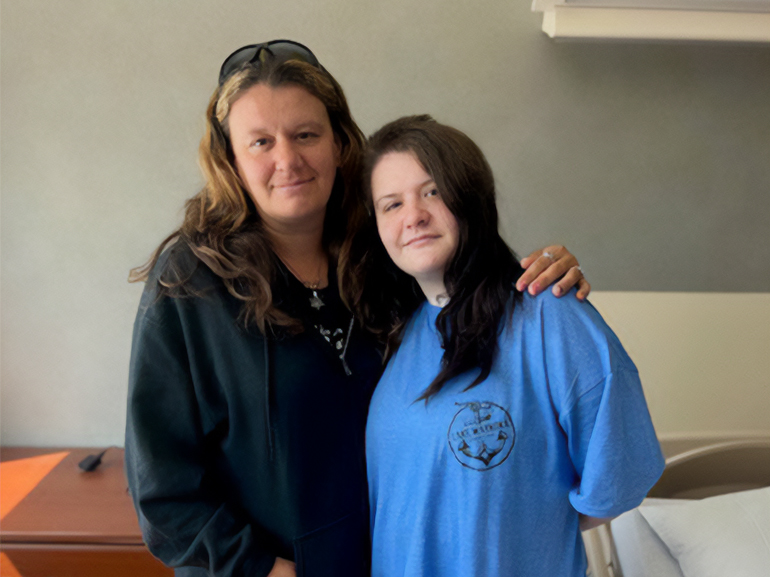Liz's story

Elizabeth "Liz" Madgwick, a vibrant 19-year-old, was enjoying life in Cincinnati, working as a sales representative and engaged in a range of activities from playing video games, fishing, swimming and spending quality time with her family. However, Liz's world took an unexpected turn when a motorcycle accident left her clinging to life.
Following the accident, Liz was rushed to the University of Cincinnati hospital for critical care. Her injuries were severe – a traumatic brain injury, acute respiratory distress and a cardiac arrest during her hospital stay. After nearly a month in acute care on a ventilator, the medical team recommended Liz transfer to Select Specialty Hospital – Cincinnati, renowned for its expertise in aiding patients who require extended recovery before rehabilitation.
Upon arrival at Select Specialty Hospital, Liz faced formidable challenges. She relied on mechanical ventilation through a tracheostomy tube inserted into her windpipe, nourishment through a feeding tube inserted into her stomach and could barely open her eyes. The physician-led team of expert nurses, therapists and clinical staff at Select Specialty Hospital developed a personalized care and treatment plan to help Liz continue the healing process. The road to recovery seemed challenging. However, she worked hard to follow simple one-step commands—such as wiggling her toes—and gradually made progress in her cognitive and physical abilities.
With the assistance of her therapists, Liz was motivated to transfer from her bed to a chair, challenging her muscles to respond to the new position. Her increased strength and stamina allowed her to work toward liberating from the mechanical ventilator with the respiratory therapy team who closely monitored her to ensure she was able to breathe without distress.
On her first day off the vent for a few hours, she worked with a speech-language pathologist to use a Passy Muir Speaking Valve — a device that enables a patient to speak while still using a tracheostomy tube for breathing support. Initially, she was able to wear the speaking valve, but was unable to speak due to recovering from her brain injury. Liz worked with the speech therapist on her speaking skills and the valve allowed her to use her voice for the first time since the accident.
Over the course of her two weeks at Select Specialty Hospital, physical and occupational therapy worked with Liz on strengthening her body. Initially quite weak, Liz focused on small movements first such as bending and straightening her fingers, and after basic daily core exercises with her care team, her muscles were strong enough to allow her to sit in bed and eventually move to the edge of the bed and standing with assistance. Due to her brain injury, Liz had to re-learn how to move her body — her determination helped her make slow and steady progress.
Ultimately, Liz was able to successfully liberate from the ventilator. But her time on the device had weakened her muscles and made it hard for her to swallow. Speech therapists worked with Liz on ingesting liquids at first, and as her muscles began working again, she was able to tolerate thicker liquids and eventually a regular diet.
Liz was beginning to feel more like herself and was ready for the next step in her journey—a transfer to TriHealth Rehabilitation Hospital to continue her recovery with inpatient rehabilitation.
Upon arrival, she had clear goals: she wanted to walk and talk on her own. Physical therapy got to work on her mobility using LiteGait, a mobile system used for gait and balance training that provides bodyweight support while a patient walks on a treadmill. They also applied external stimulation to her leg muscles to get the blood flowing and increase muscle strength while she engaged in therapy exercises.
Occupational therapy focused on getting Liz ready for discharge to home, working on meal preparation skills and activity modifications such as using a long-handled sponge for bathing, to make personal care and tasks around the home easier to accomplish. Liz's family was instrumental in her recovery, her mother and aunts provided support and participated in family training to learn how to best help Liz when she returned home. Her best friend since childhood was also by her side for emotional support.
In speech therapy, Liz learned how to use memory aids to bolster her confidence and communication, learning exercises to help with short-term memory challenges. With the strategies in place, and her increased physical strength, Liz improved her communication skills and was able to speak for herself and interact with others more effectively.
After 20 days at TriHealth Rehabilitation Hospital, Liz could walk over 200 feet on her own and had greatly improved her communication skills, meeting both of her set goals for inpatient rehabilitation. She was ready to go home and continue her recovery through outpatient therapy.
After spending over two months in acute care, critical illness recovery and inpatient rehabilitation, Liz looked forward to, “just being home.” Grateful for the care received, she had this parting advice for others experiencing a health journey: “Stay open minded and don’t be afraid to actually speak to the staff about your wants and needs. I felt like I became friends with some of these staff members, and my experience was amazing.”